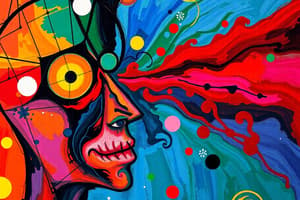Podcast
Questions and Answers
What is anhedonia?
What is anhedonia?
- An abnormal lack of energy
- A physical condition causing fatigue
- A recurrent thought of death
- The inability to feel pleasure (correct)
What is the purpose of the bereavement exclusion in diagnosing depression?
What is the purpose of the bereavement exclusion in diagnosing depression?
- To avoid misdiagnosing normal grief as depression (correct)
- To encourage immediate therapy after loss
- To ensure treatment is given promptly
- To categorize all emotional responses as disorders
Which treatment uses electrodes implanted in the brain?
Which treatment uses electrodes implanted in the brain?
- Repetitive Transcranial Magnetic Stimulation
- Deep Brain Stimulation (correct)
- Light Therapy
- Vagus Nerve Stimulation
What symptoms are associated with serotonin syndrome?
What symptoms are associated with serotonin syndrome?
What type of therapy influences melatonin levels in treating depressive disorders?
What type of therapy influences melatonin levels in treating depressive disorders?
Suicidal ideation refers to which of the following?
Suicidal ideation refers to which of the following?
Vagus nerve stimulation is primarily used for which of the following conditions?
Vagus nerve stimulation is primarily used for which of the following conditions?
What are common symptoms experienced by women in the week prior to their period?
What are common symptoms experienced by women in the week prior to their period?
What treatment is noted for addressing symptoms of depression?
What treatment is noted for addressing symptoms of depression?
Which phase is NOT part of the nursing process implementation for depression?
Which phase is NOT part of the nursing process implementation for depression?
Which of the following statements about self-assessment in patients with depression is true?
Which of the following statements about self-assessment in patients with depression is true?
What is the role of SSRIs in treating depressive disorders?
What is the role of SSRIs in treating depressive disorders?
Which emotional state is commonly assessed in patients with depression?
Which emotional state is commonly assessed in patients with depression?
Which of the following best describes anhedonia?
Which of the following best describes anhedonia?
What is a common reaction of patients with depression towards unrealistic expectations?
What is a common reaction of patients with depression towards unrealistic expectations?
What are some symptoms that may decrease with the onset of menstruation?
What are some symptoms that may decrease with the onset of menstruation?
What is a key symptom of Major Depressive Disorder?
What is a key symptom of Major Depressive Disorder?
Which disorder is characterized by constant and severe irritability in children aged 6 to 18?
Which disorder is characterized by constant and severe irritability in children aged 6 to 18?
What is the duration required for Persistent Depressive Disorder to be diagnosed in adults?
What is the duration required for Persistent Depressive Disorder to be diagnosed in adults?
What symptom is NOT associated with Premenstrual Dysphoric Disorder?
What symptom is NOT associated with Premenstrual Dysphoric Disorder?
Which combination of symptoms indicates Major Depressive Disorder?
Which combination of symptoms indicates Major Depressive Disorder?
What management techniques are commonly used for Disruptive Mood Dysregulation Disorder?
What management techniques are commonly used for Disruptive Mood Dysregulation Disorder?
How long must symptoms persist for Persistent Depressive Disorder to be diagnosed in children or adolescents?
How long must symptoms persist for Persistent Depressive Disorder to be diagnosed in children or adolescents?
What is NOT a symptom of Major Depressive Disorder?
What is NOT a symptom of Major Depressive Disorder?
Which of the following is a symptom of Persistent Depressive Disorder?
Which of the following is a symptom of Persistent Depressive Disorder?
Flashcards are hidden until you start studying
Study Notes
Depressive Disorders
- Depressive disorders share common symptoms of sadness, emptiness, inability to feel pleasure, and impairment of thinking and ability to function
- All impacts a person's ability to perform activities of daily living
- Affects are the outward representation of someone's internal state which is based on the nurse's assessment
- Anergia is the abnormal lack of energy
- Anhedonia is the inability to feel pleasure
- Bereavement exclusion, states that individuals who have experienced a significant loss, should not be diagnosed with depression within the first two months
Major Depressive Disorder
- Five or more symptoms occur during the same two-week period
- At least one of these symptoms is depressed mood, or loss of interest or pleasure
- Other common symptoms include weight loss or gain, insomnia, psychomotor retardation, feelings of worthlessness, recurrent thoughts of death, loss of ability to concentrate, and fatigue
Disruptive Mood Dysregulation Disorder
- Diagnosed in children and adolescents
- Patients experience constant and severe irritability and anger
- Temper tantrums are out of proportion to the situation
- Tantrums occur at leaast 3 times per week
- The symptoms occur in two settings: home, school, and with peers
Persistent Depressive Disorder
- Also known as dysthymia
- Low-level depressive feelings for most of the day, for the majority of days
- Lasts at least 2 years for adults and 1 year for children or adolescents
- Must have two or more symptoms including decreased appetite or overeating, insomnia or hypersomnia, low energy, low self-esteem, difficulty concentrating, and hopelessness
Premenstrual Dysphoric Disorder
- Symptom cluster occur in the last week prior to the onset of a woman's period
- Mood swings, irritability, depression, anxiety, feeling overwhelmed, and difficulty concentrating
- Symptoms decrease significantly or disappear during the onset of menses
Other Depressive Disorders
- Treatment options include SSRI's (fluoxetine, sertraline), and SNRIs (duloxetine)
- Bupropion (Wellbutrin) is used for fatigue and insomnia or sexual dysfunctions
- Duloxetine (Cymbalta) is used for chronic pain
Nursing Process
- Nursing assessment includes assessing suicidality, behavioral/affect, mood, emotions, thoughts/perceptions, and self-assessment.
Communication Techniques
- Use simple and concrete words
- Allow for response time
- Listen carefully for covert messages
- Inquire about suicide plans
- Avoid platitudes
- When the patient is silent, avoid direct questions, and reinforce reality
- Make observations
Treatments
- St. John's Wort: thought to increase serotonin, norepinephrine, and dopamine in the brain; effective for mild to moderate depression
- Electroconvulsive Therapy (ECT): used for severe malnourishment, exhaustion, and dehydration due to depression
- Transcranial Magnetic Stimulation (TMS): is non-invasive and safe for patients with metal; adverse effects include headache, lightheadedness, scalp tingling
- Vagus Nerve Stimulation: treatment for epilepsy that improves mood; potential side effects include voice alteration.
- Light Therapy: first line treatment for seasonal affective disorder; can cause headache and jitteriness
- Exercise: shown to increase serotonin availability and reduce symptoms of depression
Studying That Suits You
Use AI to generate personalized quizzes and flashcards to suit your learning preferences.




